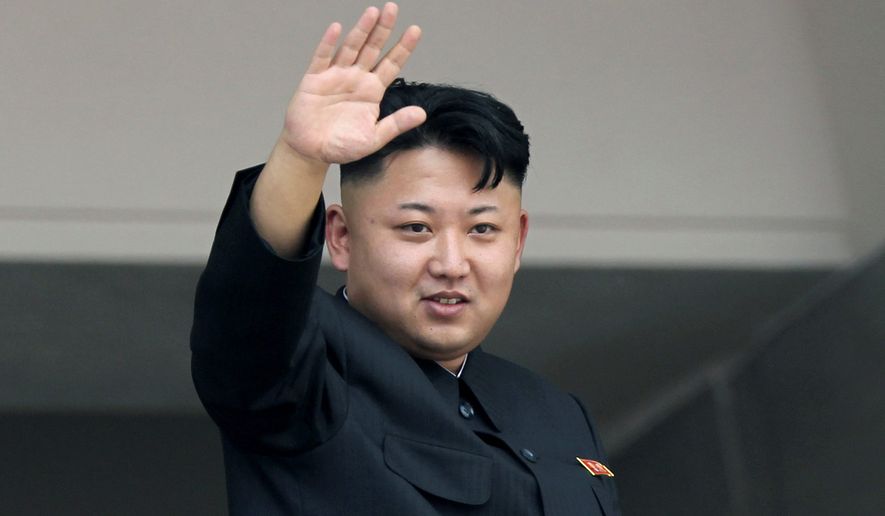The story Monday of North Korea’s obese leader, Kim Jong-un, scaling a 9,000-foot mountain — in leather shoes and neat dress coat, on a pair of legs that had undergone operation and needed a walking cane only a couple of months ago — has stirred up a firestorm on China’s Internet, the world’s largest closed cyber community with over 600 million users known as Netizens.
However, the most talked-about issue among the Netizens is not North Korean state media’s propaganda promotion of Mr. Kim’s miraculous feat April 18. There are plenty of similar tales of proletarian bravado, told in good socialist realist style, permeating China’s own state media on a regular basis.
The real controversy is how the Chinese state media identified the mountain that the robust Mr. Kim scaled: The official Xinhua News Agency and other state-run news outlets identified the peak by its Korean name, “Paektu (Baitou, Baektu or Whitehead) Mountain,” rather than the familiar Chinese name Chang Bai Mountain, the “Eternally White Mountain.”
This is remarkable because it shows that the Chinese government can be flexible on border disputes when it wants to be, depending on whether the dispute at hand suits Beijing’s geopolitical agenda. To many, such flexibility is tantamount to perfidy because the Chinese government has vowed for many decades that it will never compromise on territorial disputes of any kind, in a bid to demonstrate the Communist Party’s infallible stands on the motherland’s territorial integrity.
But China’s leaders seem to need the good will of both Pyongyang and Seoul more this time, and yielded to the Korean sensibilities by avoiding using the Chinese name for the mountain in official press accounts.
“Calling it Paektu (Baitou) Mountain is akin to calling the Diaoyudao by its Japanese name, Senkakus (Jiangedao),” one angry commenter said on the discussion forum of the People’s Daily portal, echoing hundreds of messages left on other key news portals. The Senkakus is an island chain in the East China Sea that is claimed and administered by Japan but is also wanted by China. What to call the island chain, either by its Chinese or Japanese name, has become the primary battleground on which to stake the sovereignty claim.
It would be unimaginable in today’s China that anyone would openly identify the disputed islands by their Japanese name or call the disputed territory the Chinese call South Tibet by its Indian name, Arunachal Pradesh, without receiving either a severe punishment from the government or a denunciation by the public for an act of treason.
The territorial claim to the Paektu Mountain has been controversial for centuries. This controversy has grown even more intense since the Koreans and the Manchus who ruled China as the Qing Dynasty from 1644 to 1911 considered the Paektu Mountain their sacred ancestral holy land. Over time, many Koreans moved to and settled into a vast area, roughly 17,000 square miles, north of the Yalu and Tumen rivers, traditionally the border between China and Korea that includes the Paektu Mountain and the so-called Gando region. In 1712, the Qing and the Koreans reached a border agreement that seems to have divided the Paektu into two parts. Yet the exact textual meaning of the agreement remains murky and disputed.
In 1909, however, Japan, which had just emerged triumphant from the Russo-Japanese War and become the de facto colonial ruler of Korea, negotiated with the Qing court in Beijing the Gando Convention, which placed the ethnically Korean Gando region under Chinese rule. China has kept the Gando region, known in China as the “Yanbian Korean Ethnic Autonomous Prefecture.”
At the height of the Cold War, in order to placate Pyongyang in the tense Sino-Soviet spat, Mao Zedong agreed to North Korean leader Kim Il-sung’s request to cede three-fifths of Paektu Mountain to North Korea. But North Korea rarely mentions the Chinese two-fifths stake and treats the entire Paektu as its own, even making it part of the official North Korean state emblem.
South Korea also disputes China’s ownership claims to Paektu Mountain. In fact, it is a major offense in South Korea for anyone to even use the Chinese name Chang Bai Mountain for Korea’s holy mountain. In June last year, South Korean megastars Jun Ji-hyun and Kim Soo-hyun had to forfeit a $1 million endorsement deal with a Chinese water bottling company that labeled its water as coming from the Chang Bai Mountain. The two cultural icons in South Korea had to apologize to the nation for their “grave mistake” in agreeing to the endorsement.
China, on the other hand, has treated the Chang Bai Mountain as its own, with plans to develop tourism, host international sporting events and even attempt to register it as a Chinese World Heritage Site, a move that has angered many Koreans.
The Seoul government has declared the 1909 Gando Convention null and avoid. For Kim Jong-un’s part, he first scaled the Paektu Mountain in November, which was seen as an oblique expression of defiance against China’s harsher than usual displeasure over Mr. Kim’s executions of a pro-China faction led by his uncle Jang Song-thaek. A few weeks later, over 1,000 Chinese soldiers staged a boisterous military drill just on the northern hill of the Paektu Mountain.
• Miles Yu’s column appears Fridays. He can be reached at mmilesyu@gmail.com and @Yu_miles.
• Miles Yu can be reached at yu123@washingtontimes.com.




Please read our comment policy before commenting.